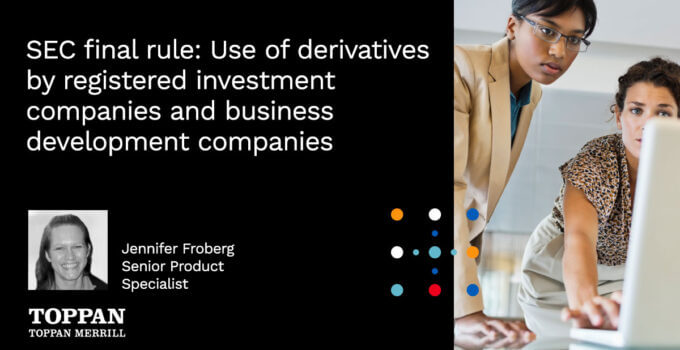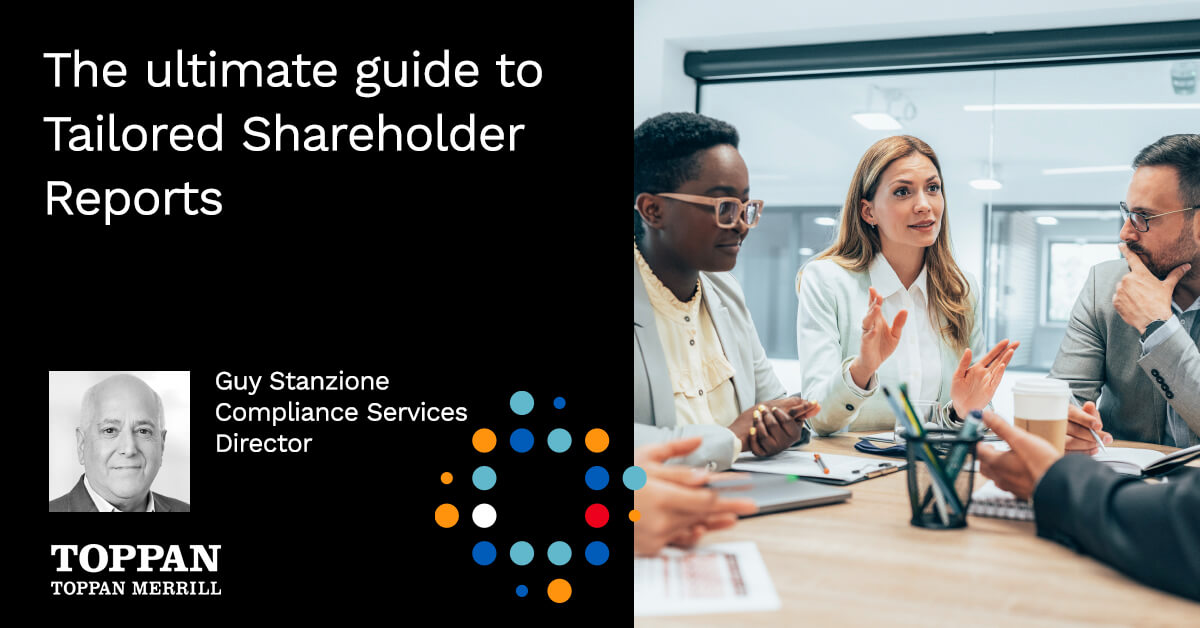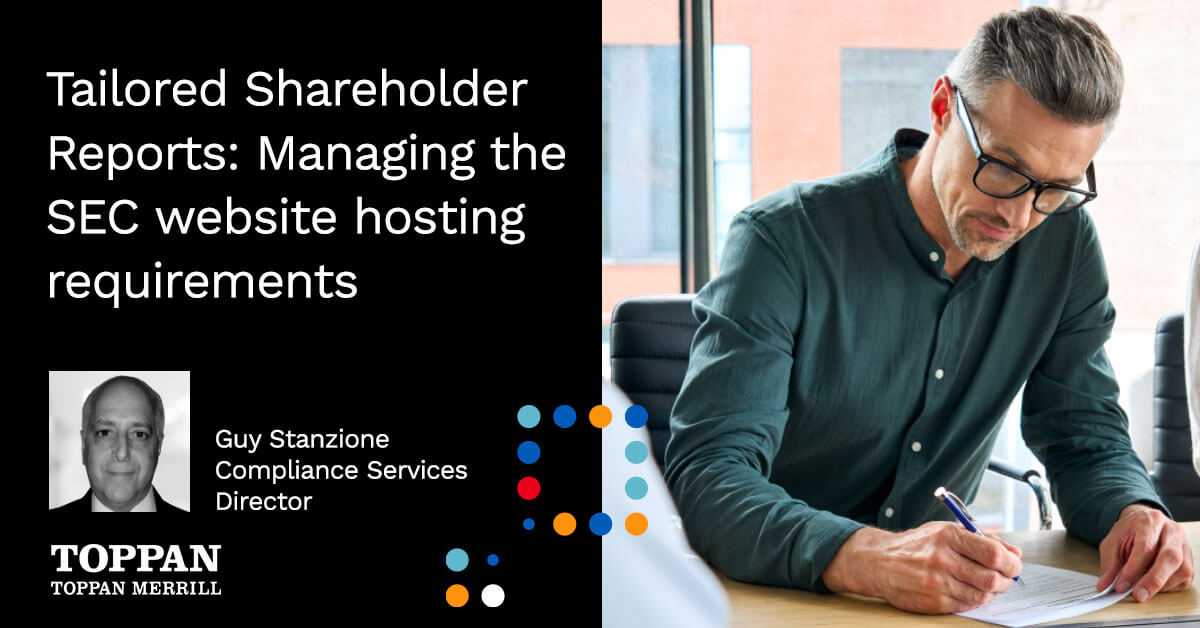Highlights:
Funds often hold derivatives in their portfolios as part of their investing strategy. These positions carry obligations and risk. Existing rules limit the ability of registered funds and business development companies to engage in transactions that involve potential future payment obligations, including derivatives positions such as forwards, futures, swaps and written options.
The new rule will permit funds to enter into derivative transactions if they comply with certain conditions designed to mitigate risk and to protect investors. The mandate is intended to create a uniform regulatory framework for Funds to manage and disclose derivative use and the associated risks. The SEC is adopting rule 18f-4 under the 1940 Investment Act. The rules will require Funds to adopt a derivatives risk management program and comply with a limit on the amount of leverage-related risk that the fund may obtain based on value-at-risk, or “VaR.”
The rules will also impose related record keeping, disclosure and form types changes.
EDGAR and Disclosure Impact:
Affected 1940 Act Funds:
-
- Mutual Funds excluding Money Market Funds
- Exchange Traded Funds (ETF)
- Closed End Funds (CEF-filing on Form N-2)
Affected form types (see detailed changes below overview section):
-
- N-2
- N-CEN
- N-PORT
- N-RN (renamed N-LIQUID)-Risk Notice
Compliance Date: August 19, 2022
The SEC is providing a transition period to allow funds sufficient time to comply with the provisions of Rule 18f-4 and the related reporting requirements, by making the compliance date eighteen months after the effective date. A fund may rely on Rule 18f-4 after the effective data but before the compliance date as long as the fund satisfies the rule’s conditions, including changes to N-CEN and N-PORT once those forms are updated on EDGAR.
Detailed Highlights
The SEC is adopting new rules, and rule and form amendments, designed to provide an updated, comprehensive approach to the regulation of funds’ use of derivatives and certain other transactions. New rule 18f-4, an exemptive rule under the Investment Company Act of 1940 (the “Act”), permits mutual funds (other than money market funds), exchange-traded funds (“ETFs”), registered closed-end funds, and business development companies (collectively, “funds”) to enter into derivatives transactions and certain other transactions notwithstanding the restrictions under section 18 of the Act. In connection with these new rules, the SEC amended rule 6c-11 under the Act to allow leveraged or inverse ETFs to operate without obtaining an exemptive order. Finally, the SEC also adopted new reporting requirements and amendments to certain disclosure forms.
Rule 18f-4 under the Investment Company Act
Rule 18f-4 provides certain exemptions from the Act subject to conditions. The conditions and other elements of the rule include the following:
- Derivatives Risk Management Program. The new rule generally requires a fund to implement a written derivatives risk management program. The program will institute a standardized risk management framework for funds, while also permitting principles-based tailoring by each fund to the fund’s particular risks. The program must include risk guidelines as well as stress testing, back-testing, internal reporting and escalation, and program review elements. A derivatives risk manager approved by the fund’s board of directors will administer the program. The fund’s derivatives risk manager will have to report to the fund’s board on the derivatives risk management program’s implementation and effectiveness to facilitate the board’s oversight of the fund’s derivatives risk management.
- Limit on Fund Leverage Risk. A fund relying on the rule generally must comply with an outer limit on fund leverage risk based on value-at-risk, or “VaR.” This outer limit is based on a relative VaR test that compares the fund’s VaR to the VaR of a “designated reference portfolio” for that fund. A fund generally can use either an index that meets certain requirements or the fund’s own securities portfolio (excluding derivatives transactions) as its designated reference portfolio. If the fund’s derivatives risk manager reasonably determines that a designated reference portfolio would not provide an appropriate reference portfolio for purposes of the relative VaR test, the fund would be required to comply with an absolute VaR test. The fund’s VaR generally is not permitted to exceed 200% of the VaR of the fund’s designated reference portfolio under the relative VaR test or 20% of the fund’s net assets under the absolute VaR test.
- Exception for Limited Users of Derivatives. The rule provides an exception from the program and VaR test requirements provided that the fund adopts and implements written policies and procedures reasonably designed to manage its derivatives risks. A fund may rely on this exception if the fund’s derivatives exposure is limited to 10% of its net assets, excluding certain currency and interest rate hedging transactions.
- Alternative Requirements for Certain Leveraged /Inverse Funds. Leveraged/inverse funds will generally be subject to rule 18f-4 like other funds, including the requirement to comply with the VaR-based limit on fund leverage risk. This will effectively limit leveraged or inverse funds’ targeted daily return to 200% of the return (or inverse of the return) of the fund’s underlying index. The final rule provides an exception from the VaR requirement for leveraged or inverse funds currently in operation that seek an investment return above 200% of the return (or inverse of the return) of the fund’s underlying index and satisfy certain conditions.
- Reverse Repurchase Agreements and Unfunded Commitment Agreements. The rule permits a fund to enter into reverse repurchase agreements and similar financing transactions, as well as “unfunded commitments” to make certain loans or investments, subject to conditions tailored to these transactions.
- When-Issued, Forward-Settling, and Non-Standard Settlement Cycle Securities. The rule permits funds, as well as money market funds, to invest in securities on a when-issued or forward-settling basis, or with a non-standard settlement cycle, subject to conditions.
- The rule requires that the fund comply with certain recordkeeping requirements.
Amendments to Rule 6c-11
Amendments to Investment Company Act rule 6c-11 permit leveraged or inverse ETFs to rely on rule 6c-11 if they comply with all applicable provisions of rule 18f-4. The SEC is also rescinding the exemptive orders previously issued to the sponsors of leveraged or inverse ETFs in connection with these amendments.
Reporting Requirements
Funds will be required to report confidentially on a current basis on Form N-RN if the fund is out of compliance with the VaR-based limit on fund leverage risk for more than five business days. Funds currently required to file reports on Forms N-PORT and N-CEN will be required to provide certain information regarding a fund’s derivatives use. This will include information regarding the fund’s VaR, as applicable, and information about the fund’s derivatives exposure (for funds that rely on the limited derivatives user exception in rule 18f-4).
Relevant Staff Guidance
The SEC is also rescinding the 1979 General Statement of Policy (Release 10666) that provided guidance on how funds may engage in certain trading practices in light of section 18’s restrictions. In addition, staff in the Division of Investment Management has reviewed its no-action letters and other guidance addressing funds’ use of derivatives and other transactions covered by rule 18f-4. Some of these staff letters and staff guidance will be withdrawn
Form specific changes
N-PORT
- Add new items to Part B (“Information About the Fund”), and revise some of the form’s General Instructions.
- Only a fund that relies on the limited derivatives exception in rule 18f-4 will be required to report this information. A limited derivatives user will also be required to break out certain aspects of its derivatives exposure (e.g., exposure from currency and interest rate derivatives that hedge related risks), and report the number of business days (in excess of the five-business-day remediation period provided in rule 18f-4) that derivatives exposure exceeded 10% of its net assets, to assist the SEC in monitoring compliance with the limited derivatives user exception.
- Tailor the VaR-related information that funds are required to report to include the VaR-related information which most effectively portrays a fund’s use of derivatives.
- Modify the proposed requirement to make all information reported in response to the new N-PORT items publicly available. In a change from the proposal, information about a limited derivatives user’s derivatives exposure, as well as a fund’s median daily VaR, median VaR ratio and VaR back testing exceptions, will be confidentially reported to the SEC and not publicly disclosed.
- Amend rule 22e-4 and a related reporting requirement on Form N-PORT to remove references to assets “segregated to cover” derivatives transactions.
Form N-RN
- Confidential
- Form N-LIQUID will be retitled as Form N-RN and amended to include new reporting events for funds that are subject to the VaR-based limit on fund leverage risk. These funds will be required to determine their compliance with the applicable VaR test on at least a daily basis. Applicable funds are required to file Form N-RN to report information about VaR test breaches under certain circumstances.
- Currently, only registered open-end funds (excluding money market funds) are required to file reports on Form N-LIQUID (to be re-titled as Form N-RN). Under the final rule, all funds that are subject to rule 18f-4’s limit on fund leverage risk to file current reports on Form N-RN regarding VaR test breaches.
- The new current reporting requirement is designed to provide the SEC with current information regarding potential increased risks and stress events (as opposed to delayed reporting on Form N-PORT). The one-business-day time frame for Form N-RN reporting— after a fund has been out of compliance with the VaR test for five business days—is designed to provide an appropriately early notification to the SEC of potential heightened risks, while at the same time providing sufficient time for a fund to compile and file its report on Form N-RN. This time frame is also consistent with the current required timing for reporting other
- A fund that breached its VaR test and has filed an initial report on Form N-RN is not required to file additional reports while it is working to come back into compliance.
N-CEN
- Require a fund to identify whether it relied on rule 18f-4 during the reporting period.
- Requiring a fund to identify whether it relied on any of the exceptions from various requirements under the rule, specifically:
- Whether the fund is a limited derivatives user excepted from the rule’s program requirement and VaR-based limit on fund leverage risk; or
- Whether the fund is a leveraged/inverse fund that will be excepted from the limit on fund leverage risk.
- In addition, a fund will have to identify whether it has entered into reverse repurchase agreements or similar financing transactions pursuant to the rule.
- In a change from the proposal, a fund must identify whether it entered into such transactions either under: (1) the provision of rule 18f-4 that requires compliance with section 18’s asset coverage requirements; or (2) the provision that allows funds to treat these transactions as derivatives transactions for all purposes under the final rule
- All new information reported on Form N-CEN pursuant to this rulemaking will be publicly available
Form N-2
- Amended to provide that funds relying on rule 18f-4 will not be required to include their derivatives transactions and unfunded commitment agreements in the senior securities table on Form N-2. This conforms Form N-2’s senior securities table to the provisions of the final rule that provide that a fund’s derivatives transactions and unfunded commitment agreements entered into in compliance with the rule will not be considered for purposes of computing asset coverage under section 18(h)
References/Resources
SEC press release: https://www.sec.gov/news/press-release/2020-269
Law firm summaries:
- https://corpgov.law.harvard.edu/2020/11/28/new-rule-governing-use-of-derivatives-by-registered-investment-companies-and-bdcs/
- https://www.ropesgray.com/en/newsroom/alerts/2020/11/SEC-Adopts-Rule-18f-4-Concerning-Registered-Funds-Use-of-Derivatives
- https://www.skadden.com/insights/publications/2020/11/sec-adopts-rules-for-use-of-derivatives
Toppan Merrill is here to help.
Should you have questions about the 1940 Securities Act and the compliance requirements for investment companies, visit ToppanMerrill.com, connect with us via [email protected] or by phone at 800.688.4400.
Jennifer Froberg, Senior Product Specialist at Toppan Merrill
With over 15 years of industry experience in the SEC regulatory landscape, Jennifer supports and advises clients in how to get their filings right. Part of a Toppan Merrill team of EDGAR experts who provide practical compliance expertise in a variety of subjects, Jennifer focuses on analyzing the scope of SEC rulemaking and where the agency is headed.
Toppan Merrill’s deep SEC subject matter knowledge provides companies with an array of pragmatic tools to navigate the frequently changing SEC requirements. Jennifer is immersed in how regulatory changes will impact the filers, investors and the market. She has a particular focus on structured data and ESG initiatives.



